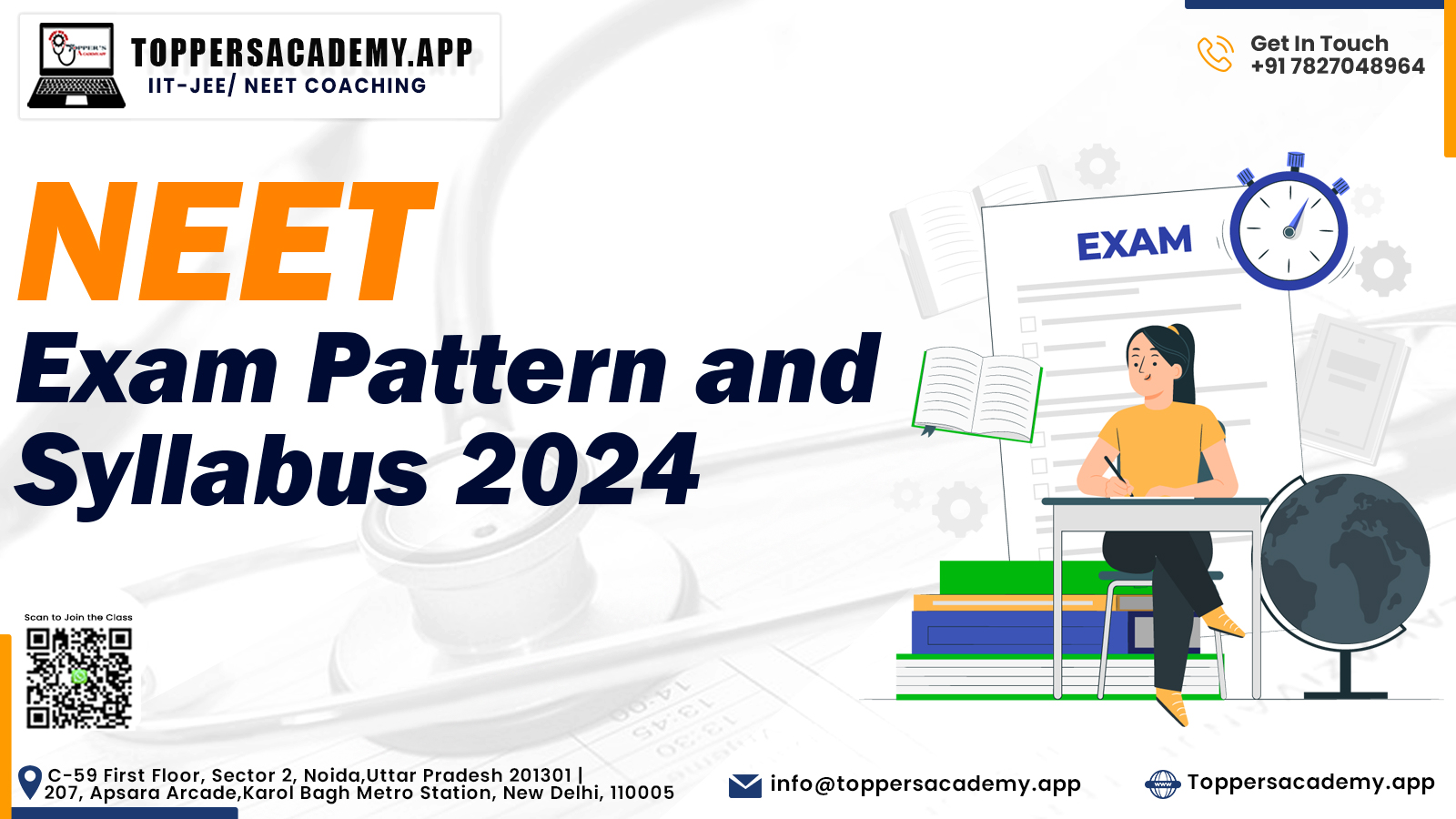NEET Exam Pattern 2025 Highlights

NEET exam pattern 2025 will be announced by the National Testing Agency in January 2025. The exam pattern of NEET 2025 will be designed to select the best candidates for the medical and allied courses. Candidates who wish to score well in NEET must be well versed with the exam pattern of NEET 2025. Details such as mode of the examination, medium, marking scheme and the duration of the examination will be covered under the NEET exam pattern 2025. The National Eligibility cum Entrance Test will be conducted offline and will be held for a duration of three hours.
According to the exam pattern of NEET 2025, candidates will be given an OMR sheet to mark their responses. Thus, it becomes important to know everything about the OMR sheet and how to mark the responses on it. NEET exam pattern 2025 also controls the number of questions that will be asked from each subject
NEET Exam Pattern 2025
| Mode Of the Examination | Offline |
|---|---|
| Languages | English, Hindi, Bengali, Assamese, Gujarati, Kannada, Tamil, Telugu, Urdu, Odia, Marathi |
| Duration Of the Exams | Three Hours |
| Type Of Questions/ Nature | Multiple Choice Questions |
| Total Number Of Questions | 180 |
| Total Marks | 720 |
| Negative Marking | Yes |
| Marking Scheme | + 4 for correct answer, -1 for an incorrect answer |
| Total Sections in the Question Paper | 3 |
| Name of Each Section and number of Questions asked from it | 1.Physics: 45 2.Chemistry: 45 3.Biology: 90 |
NEET 2025 Pattern: An Overview of the Question Paper
According to the exam pattern of NEET 2025, the NEET question paper will comprise of three sections- Physics, Chemistry and Biology. The table given below depicts the section-wise weightage and breakup of the question paper.
NEET 2025 Subject-Wise Weightage
| Subject | Number Of Questions | Maximum Marks |
|---|---|---|
| Physics | 45 | 180 |
| Chemistry | 45 | 180 |
| Biology (Botany+ Zoology) | 45+45 | 180 |
| Total | 180 | 720 |
NEET 2025 Marking Scheme
- Each correct answer will be awarded four marks.
- One mark will be deducted for every incorrect answer.
- No mark will be deducted for the questions which have not been answered.
- Questions that have two or more responses marked on the OMR sheet will be considered as incorrect and one mark will be deducted for them.
| Marking Scheme On NEET 2025 | Marks Awarded |
|---|---|
| Correct Answer | +4 |
| Incorrect Answer | -1 |
| Question With more than one response | -1 |
| Unanswered | 0 |
Important Points to Remember While Marking the OMR Sheet
- Answers have to be marked using a ballpoint pen which will be provided in the examination hall
- Changing of answers on the OMR sheet is not allowed
- Erasing/ obliterating any information printed on the OMR sheet is a punishable offence
- Rough work should be done on the test booklet only
- A Candidate must not forget to mark the test booklet code on the OMR sheet
Language Options in the Exam Pattern of NEET 2025
| Medium | Availability in the NEET Exam Center |
|---|---|
| English | Available at all exam centers/ cities |
| Hindi | Available at all exam centers/ cities |
| Marathi | Available at all exam centers in Maharashtra |
| Bengali | Available at all exam centers in West Bengal |
| Gujarati | Available at all exam centers in Gujarat, Daman, and Dadra Nagar Haveli |
| Tamil | Available at all exam centers in Tamil Nadu |
| Telugu | Available at all exam centers in Andhra Pradesh and Telengana |
| Kannada | Available at all exam centers in Karnataka |
| Oriya | Available at all exam centers in Odisha |
| Assamese | Available at all exam centers in Assam |
Important Points to Remember While Choosing the Medium of NEET 2025
- The medium of question paper has to be selected in the NEET 2025 application form.
- The language chosen once cannot be changed.
- Candidates who have opted for English as a medium will be provided the Test Booklet in English language only.
- Candidates opting for any other language will be provided a Bilingual Test Booklet, their selected language preference, and English.
- The English version of the NEET question paper shall be treated as final in case of any ambiguity in translation of any of the questions.
NEET Syllabus 2025
NEET Syllabus 2025 comprises of three subjects – Physics, Chemistry and Biology. Topics covered in these three subjects from Class 10 to Class 12 are all included in the syllabus of NEET 2025. Candidates who wish to appear for the examination are advised to go through the NEET syllabus 2025 before starting their preparation. In this article, we have divided the syllabus of NEET 2025 into two parts, that is, the topics covered in Class 11 and those covered in Class 12. As the official NEET syllabus will be announced with the admission notification in December, candidates can refer to the syllabus given below during the interim period to start their preparation. Along with the syllabus of NEET 2025, this article also includes a list of the books suggested by experts and toppers. Read the complete article to get all the information about the NEET syllabus, chapter-wise weightage and the best books.
NEET Syllabus 2025 for Chemistry
Class 11
- Some Basic Concepts of Chemistry
- Structure of Atom
- Classification of Elements and Periodicity in Properties
- Chemical Bonding and Molecular Structure
- States of Matter: Gases and Liquids
- Thermodynamics
- Equilibrium
- Redox Reactions
- Hydrogen
- s-Block Element (Alkali and Alkaline earth metals)
- Some p-Block Elements
- Organic Chemistry- Some Basic Principles and Techniques
- Hydrocarbons
- Solid State
- Solutions
- Electrochemistry
- Chemical Kinetics
- Surface Chemistry
- General Principles and Processes of Isolation of Elements
- p- Block Elements
- d and f Block Elements
- Coordination Compounds
- Haloalkanes and Haloarenes
- Alcohols, Phenols and Ethers
- Aldehydes, Ketones and Carboxylic Acids
- Organic Compounds Containing Nitrogen
- Biomolecules
- Polymers
- Chemistry in Everyday Life
- Electronic Devices
Class 12
- Environmental Chemistry
NEET Syllabus 2025 for Biology
Class 11
-
- Diversity in Living World
- Structural Organisation in Animals and Plants
- Cell Structure and Function
- Plant Physiology
- Reproduction
- Genetics and Evolution
- Biology and Human Welfare
- Biotechnology and Its Applications
- Ecology and environment
Class 12
- Human physiology

